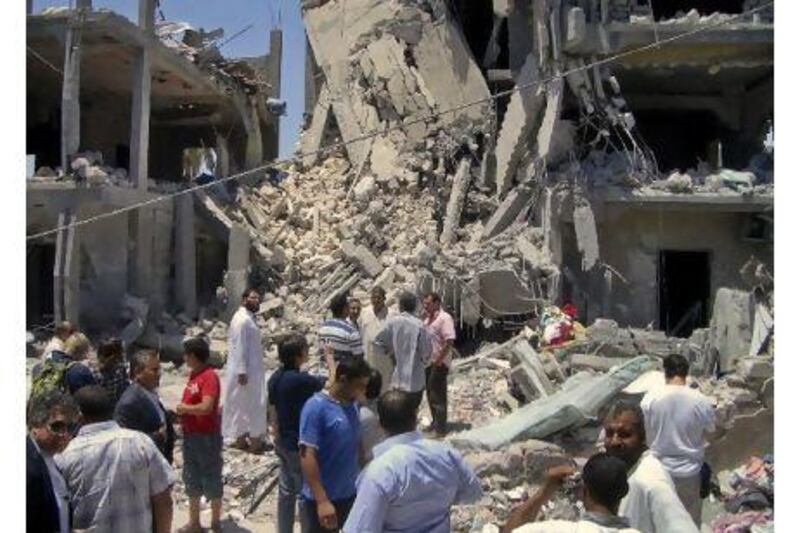SURMAN // Libya's government said a Nato air strike early yesterday west of Tripoli struck a family compound belonging to a close associate of Colonel Muammar Qaddafi, killing at least 15 people, including three children.
A Nato official in Naples, Italy, said the alliance had not conducted any strikes in that area in the past 24 hours.
Colonel Qaddafi's regime has repeatedly accused the alliance of targeting civilians, in an attempt to rally support against international intervention in Libya's civil war. Nato insists it tries to avoid killing civilians, although on Sunday it acknowledged that an air strike accidentally struck a residential area in Tripoli.
The Libyan government spokesman Moussa Ibrahim said the alliance bombed the compound belonging to Khoweildi Al Hamidi outside the city of Surman, 60 kilometres west of the capital, about 4am yesterday.
Mr Al Hamidi is a regime insider who took part in the 1969 coup that brought Colonel Qaddafi to power. He reportedly commanded a battalion that crushed rebels in the western city of Zawiya in March, and his daughter is married to one of Colonel Qaddafi's sons, Saadi.
Mr Ibrahim said Mr Al Hamidi escaped the air strikes unharmed but that three children, two of them Mr Al Hamidi's grandchildren, were among the 15 people killed.
"They are targeting civilians. The logic is intimidation," Mr Ibrahim told reporters at the site. "They want Libyans to give up the fight. They want to break our spirit."
Foreign journalists based in the Libyan capital were taken by government officials to the walled compound, where the main two-storey buildings had been blasted to rubble. A pair of craters could be seen in the ground, and rescue service workers with sniffer dogs were searching the rubble for people. The smell of smoke was thick in the air.
In a hospital in the nearby city of Sabratha, medical workers showed journalists the bodies of at least 10 people, including those of two children, allegedly killed in the strike. Some of the bodies were charred beyond recognition, while others had been half blown apart.
Nato has rejected the Libyan government's allegations that it targets civilians. However, mistakes have occurred. The alliance acknowledged that an air strike on Sunday accidentally struck a residential neighbourhood in the capital, killing civilians. The Libyan government said nine people died in the attack.
A coalition including France, Britain and the United States launched the first strikes against Colonel Qaddafi's forces under a United Nations resolution to protect civilians on March 19. Nato, which is joined by a number of Arab allies, assumed control of the air campaign over Libya on March 31.
From their de facto capital of Benghazi, the rebels have wrested control of much of the eastern half of the country. They also control pockets in the west, mainly around the port city of Misurata and in the Nafusa mountains south of Tripoli.
In Luxembourg, European Union foreign ministers yesterday condemned the Libyan regime, saying in a statement that "time is not on Qaddafi's side" and that the Libyan leader "has lost all legitimacy to remain in power".
The 27 foreign ministers also toughened EU sanctions against the regime by adding six port authorities controlled by Colonel Qaddafi's forces to its asset-freeze list. The ports were not named.
In a similar move, the Central Bank of the UAE ordered a freeze on the accounts of 19 Libyan individuals and institutions while an investigation of the funds is under way into possible links to Colonel Qaddafi's regime.





